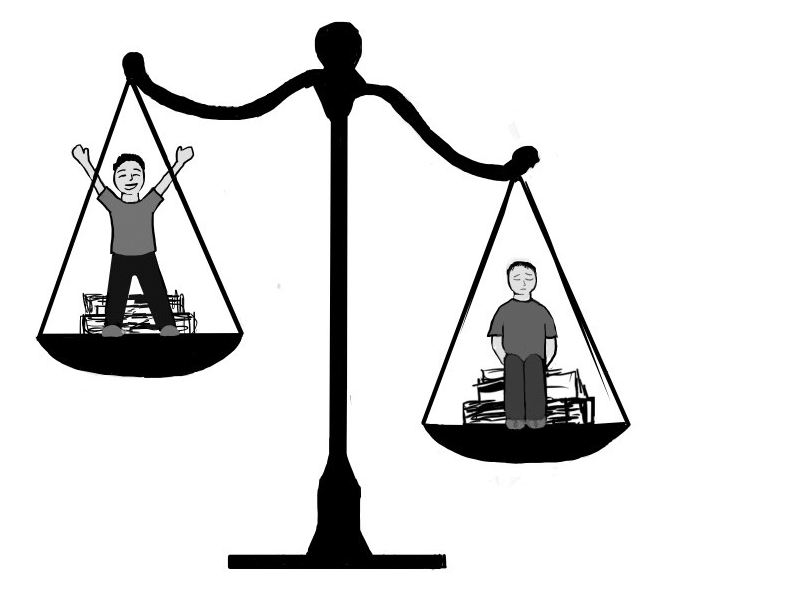“Ugh, I have so many tests this week! There’s no way I can handle everything.” “You’re so lucky. You got the easier teacher.”
Walking down the halls of Palo Alto High School, I hear these phrases repeated again and again. Every time I engage in a conversation about schoolwork, I know it will end in one of two ways: Either the other person will complain about their workload, or they’ll grumble about how much easier mine is. Not only does this perpetuate insecurity, but it also has no benefit in helping either person with their work. It’s just another way for people to subtly show off their workload and simultaneously make them feel better about themselves in a cynical way.
“Comparing has always been a problem at this school,” says Angelina Michael, Paly’s wellness outreach worker. Even though this mindset seens ingrained in our culture, it would benefit students to try to reduce their complaining, as shown by scientific studies that demonstrate the benefits of positive thinking.
A study conducted by the University of Toronto shows that having a positive mindset, as opposed to a negative one, directly affects how the brain contextualizes and stores information.
The study, conducted by psychology professor Adam Anderson, shows that when we’re in a positive mood, our visual cortex takes in more information, while negative moods result in tunnel vision, which means that we tend to focus exclusively on a limited point of view.
When people engage in negative conversation, they walk into any test or exam with a negative mindset, perform worse than they could have and subsequently create negative associations with school. It’s a vicious, never-ending cycle.
“It [complaining] can contribute to feeling more anxiety than is okay, … than is healthy,” says Eva Whitney, the Counseling and Support Services For Youth therapist at Paly.
On the other hand, conversations that focus on growth make for a happier school environment. Our brains will be able to make deeper connections, not only in relation to schoolwork, but in all aspects of life. Elizabeth Spector, Paly’s wellness coordinator, emphasizes the importance of mindset.
“Sometimes, the negative thoughts become a self-fulfilling prophecy, so if you think that something is going to happen, just thinking about the actions cause[s] it to happen.”
So what can we do to promote positive thinking? Individually, we can make the conscious decision to verbalize our appreciation and to equally acknowledge all parts of life, both negative and positive.
“What I recommend is starting a journal, a gratitude journal,” Spector says. “Every day, you write three things that you’re thankful for. Never the same things. It’s just about noticing those good moments in life.”
However, there is also a lot that we can do as a community. Trading negative conversations for discussions about topics of mutual interest can create more productive conversations. For me, just having stimulating conversation with my friends about various current events, or laughing about a funny joke online is enough to make me leave school feeling happier, healthier, and more motivated to do my work. I know there is a direct correlation because I’ve felt it.
I know that this is a hard feat to achieve. I am guilty myself of complaining and brooding about my tests or schoolwork. It isn’t easy to stop discussing school when that is where we spend the majority of our time. But there are small steps we can take to associate the word “school” with more positive connotations. It all starts with one word: balance.
But there are small steps we can take to associate the word “school” with more positive connotations. It all starts with one word: balance.
“That word balance … that’s huge. It means creating balance in your life, so that it’s not all work … but finding time for fun,” Spector says.
Ultimately, finding balance is something that many people struggle with throughout their lives. If we learn the skills necessary to maintain our happiness and zest for learning in an environment that sometimes seems all too focused on the outcome, it can help us go further in life than any grade or test score can. v




